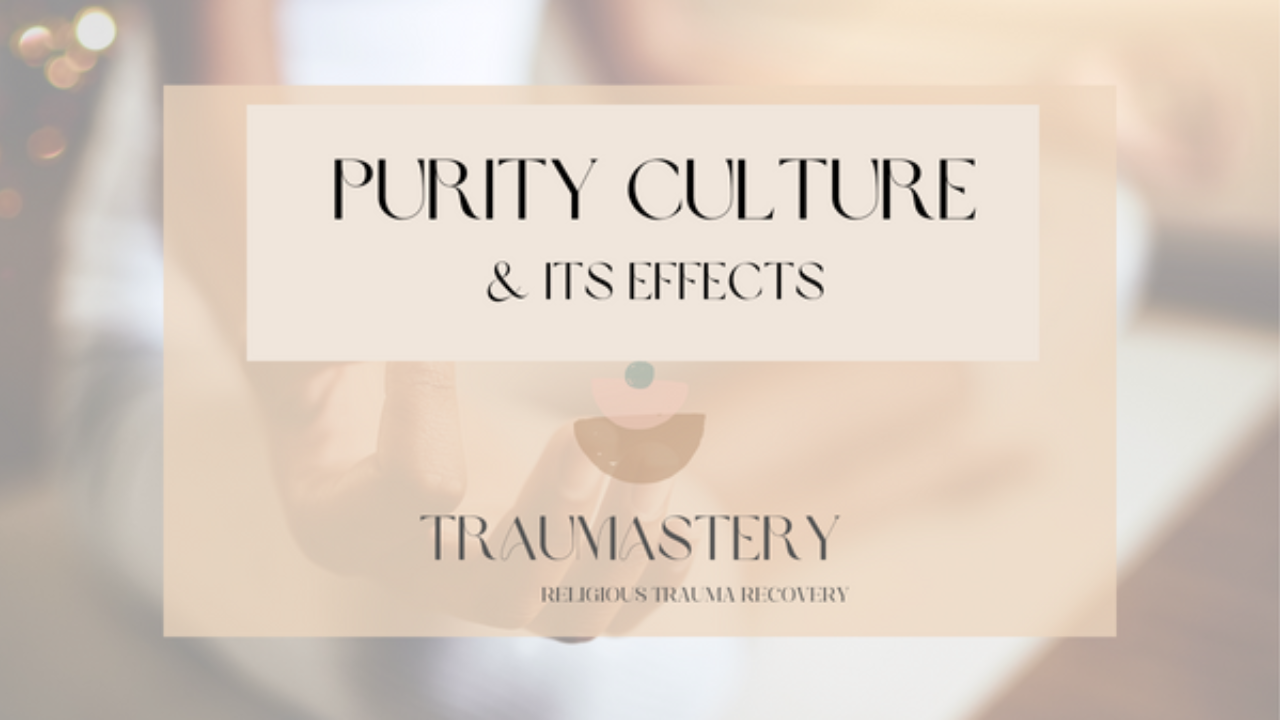Demands of Purity Culture & Its Impact

Purity Culture is a White, Evangelical Christian American phenomenon that was at its peak in the 1990s. Purity Culture strongly emphasized remaining pure by not engaging in impure sexual activity- any sexual activity outside of heterosexual Christian marriages.
Some of the media, organizations, and customs that you may recognize from this time are:
-
Abstinence-Only Sex Education
-
I Kissed Dating Goodbye by Josh Harris
-
Purity Balls
-
Purity Rings
-
Silver Ring Thing
-
True Love Waits (Southern Baptist organization sponsored by Lifeway Christian Resources)
If any of the items on the above list sound familiar to you, then you may have been impacted by the demands of Purity Culture. Purity Culture made blanket statements about what type of sexual activity was acceptable. Purity Culture was hyper-fixated on sexuality and sexual activity without having real conversations on sexual education, sexual ethics, relational boundaries, and developing romantic and sexual relationships.
Purity Culture was typically closely connected with American Evangelical churches and ministries. Many teens heard sermons or went to conferences that spoke on why they should not have sex outside of heterosexual Christian marriages. This messaging is deeply infused with shame.
One of the big messages in Purity Culture was that women and girls being modest prevents boys and men from lust, sexual attraction, and sexual activity. This message led to a lot of shame, and placed the responsibility on girls and women to prevent sexual assault and sexual activity. In this way, and many others, Purity Culture is very closely connected with Rape Culture.
Shame was one of the primary tactics used in Purity Culture to try to prevent individuals from having sex. Many vivid shame imageries were utilized to illustrate why sex outside these contexts is sinful.
Some illustrations used to depict the effects of sex were:
-
Chewing up gum (sex with one partner) and then offering the gum to someone else (another sexual partner).
-
Used tape: the more things you stick a piece of tape to (the more sexual partners you have), the dirtier and less sticky it gets.
-
A used tissue: blowing your nose in a tissue (sex with one partner) and then offering the used tissue to someone else (another sexual partner).
-
Giving pieces of your soul away to each person that you are sexually active with (you are only whole if you have sex in the “right” context).
All of these examples were used to demonstrate the idea that if someone was sexually active, they were dirty, sinful, and not whole. Purity Culture is insidious- its effects are long-lasting and harmful. The shame instilled through sermons, conversations, and messages was meant to impact your sexuality and actions. As an adult, you may have chosen to reject the guidelines that Purity Culture imposed on you. However, you might notice that its shame and messages still impact you and your relationships.
Some of the effects of Purity Culture are:
-
Anxiety, guilt, and shame around sexual activity
-
Difficulties building deep relationships (emotional, romantic, and sexual)
-
Difficulty setting boundaries
-
Fixation on finding “The One”
-
Limited or no sexual education
-
Pelvic floor issues
-
STIs
-
Unplanned pregnancies
-
Unsafe sex
-
Vaginismus
Purity Culture creates religious trauma. We know that religious trauma impacts every aspect of your life, but you deserve peace and healing. You have the right to create a sexual ethic that maintains your boundaries and values. This is a brief overview of Purity Culture, so we aren’t talking about recovery in great detail but I do want to leave you with a few tools that you can start with.
This blog discusses 2 ways to overcome religious trauma- Overcoming Religious Trauma
This blog is a great resource that was created in partnership with Origin Physical Therapy + Traumastery about the effects of trauma on your pelvic floor. - How Trauma Impacts the Pelvic Floor
Before you start your pelvic floor and trauma recovery, you might consider learning a big more about how your brain and body has processed trauma. We suggest you start with our Self-Care After Trauma workbook for a go-at-your-own-pace resource to begin understanding how the brain and body are holding onto trauma and what you can do about it.
Therapists: If you are a therapist looking for more professional growth and education on religious trauma and cult recovery, we have a community curated just for you. Join us at A Year of Non-Magical Thinking for Therapists to learn how to help your clients in realistic and competent ways.


